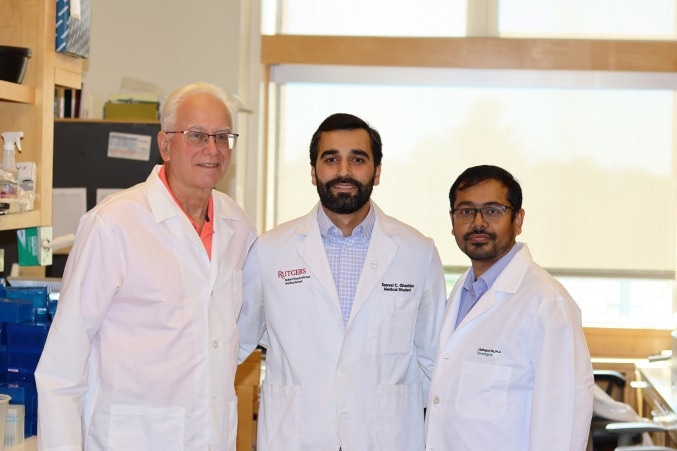Researchers from Rutgers Cancer Institute of New Jersey and RWJBarnabas Health investigated the microbiome of pancreatic tumors and discovered certain microbes linked to inflammation and poor survival.
 Martin Blaser, Bassel Ghaddar, and Subhajyoti De. Image Credit: Rutgers University
Martin Blaser, Bassel Ghaddar, and Subhajyoti De. Image Credit: Rutgers University
According to the investigators, these microbes could be potential targets for earlier diagnosis or treatment of pancreatic cancer, which is the fourth highest cause of cancer death in both men and women in the United States. The research was published in the online version of Cancer Cell.
In human bodies, there are more microbes—small organisms that cannot be observed by the naked eye—than human cells. They have been detected in organs like the pancreas, which was once thought to be microbe-free.
Subhajyoti De, chief investigator at Rutgers Cancer Institute and senior author of the paper, and graduate student Bassel Ghaddar began investigating whether microorganisms thrive in pancreatic tumors and whether they affect cancer growth or treatment. Microbes in tumors are challenging to study, partially because each patient is unique and microbial imprints are too subtle to identify effectively.
The investigators partnered along with Martin Blaser, the Henry Rutgers Chair of the Human Microbiome at Rutgers and a recognized microbiome specialist, to conduct an additional study. To locate microorganisms connected to specific human cells, the researchers created a genomic strategy named single-cell analysis of host-microbiome interactions (SAHMI).
Employing sophisticated software, the scientists sifted through millions of RNA sequences to determine which ones most likely indicate human genes and which ones are microbial in origin.
This new technique allowed us to identify tumor-associated microbes and measure the activity of the host cells at the same time, which is a significant technical advance.”
Subhajyoti De, Associate Professor, Cancer Systems Biology, Robert Wood Johnson Medical School, Rutgers University
The findings were mindblowing: The researchers discovered bacteria associated with distinct cell types within pancreatic tumors in two independent groups of pancreatic tumors, which were completely absent in normal pancreatic tissues.
These bacteria were mostly found inside tumor cells, and their abundance was associated with cancer-related cell activity. The unique microorganism signatures discovered indicated very aggressive cancer growth and a poor prognosis.
The presence of microbial footprints within pancreatic tumors sparked the question of whether the existing immune cells were responding to the disease or to the microbes. The results of the research revealed that immune responses were primarily reacting to microorganisms in the tumor rather than cancer cells.
Our observations provide a new view about why pancreatic cancers are so difficult to treat. But better understanding these interactions may identify new approaches for therapies.”
Martin Blaser, Professor, Epidemiology and Biostatistics, School of Public Health, Rutgers University
Martin Blaser is also a research member at the Rutgers Cancer Institute.
Source:
Journal reference:
Ghaddar, B., et al. (2022) Tumor microbiome links cellular programs and immunity in pancreatic cancer. Cancer Cell. doi.org/10.1016/j.ccell.2022.09.009.